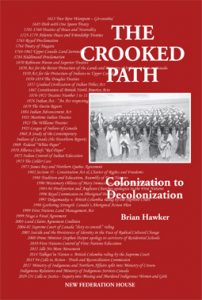 My book, The Crooked Path: Colonization to Decolonization, is published by New Federation Press.
My book, The Crooked Path: Colonization to Decolonization, is published by New Federation Press.
The book is based on my experiences and observations over many years working in and with indigenous communities. I have witnesses time and again how colonialism pervades dealings between First Nations and “the rest of us,” setting up barriers, perpetuating stereotypes, stymying communication and connection and thwarting, at every turn, the very possibility of change.
In the book, I argue that fundamental change is possible. There are ways of meeting, talking and addressing problems that really work. But for progress to be made there needs to be more than good intentions, more than mutual respect in principle; the playing field needs to be level, meaning equal power to effect change, equal authority in making decisions, and equal economic power to do things differently and better.
Softcover, 358 pages, $29.95
CLICK HERE TO ORDER DIRECTLY FROM THE PUBLISHER
CLICK HERE TO ORDER FROM AMAZON.CA
More about the book:
For 145 years, the Indian Act has laid out the rules of engagement between Indigenous people in Canada and the non-native majority. Although this document has no relevance to the average Canadian, it governs every important aspect of life in Indian Country and every statistic in every study and survey confirms that it doesn’t govern well.
The Indian Act is the tip of a legislative iceberg that includes 300 years of attempts to manage, not fix, the outcome of a dark chapter in Canadian history.
Why do the majority of Indigenous children still live in poverty and without opportunities to develop and thrive?
Why do Indigenous educational, health care and legal systems continue to require the services of non-native professionals at all levels?
Why do Indigenous suicide and incarceration rates far exceed the national average?
Why do the majority of mainstream Canadians respond to this situation with either quiet indifference or with allegations of financial mismanagement?
The living conditions and prospects for this population would be very different today if past solutions had any substance.
After working for twenty years in many remote fly-in reserves in Northwestern Ontario as a teacher and educational consultant, I have concluded that vested interests support the chronic pessimism that things will never be able to change and that the status quo causes needless suffering for Indigenous children. I make the case that change will happen only when the key players enact a new relationship uncontaminated by the false hope that only money and politics, the failed remedies of the past, will fix everything.
I believe that Indigenous children have been forgotten and that those on both sides of this legislative wall, those with the power and opportunity to influence, need to learn to give in order to get. This includes:
- removing the barriers that separate specialized, but un-coordinated, forms of assistance,
- listening to and empowering those whose voices have not been acknowledged, and
- revitalizing the languages that are essential to restoring the mental health and dignity of those subjected to unjust legislation.
There is no question that it will take an interdisciplinary approach to break the gridlock that has created thousands of jobs for people who have not changed the statistics. These changes would repair the broken connections in our history of treaty making and create a shared vision allowing Indigenous children to find the best versions of themselves.